#great writing advice
Explore tagged Tumblr posts
Text
Something I have in my personal arsenal of tips and tools for writing and storytelling is something I learned seven years ago and it can be summed up by:
Don’t like it? Rewrite it
By Bri/Gobbo
Great hook huh? Now there’s many pieces of media that have a story or plot that we don’t like (feel free to share ones you don’t like in replies or reblogging) and many of us who have thought the same thing:
I could do it better
So what’s stopping you? Yes rewrite that story that premise and concept that’s been made by big corporate or fake activist. Or maybe it’s a fic made by a bad person?
The core concept of rewriting something to what you would do differently is an excellent way to practice writing stories and plots for many starting out. It helps with framing, fleshing out characters and so much more that is good practice in the industry!
I don’t plan to make this long but I will end with a clip from the video I learned this from, be nice now
And I’m sure yall know about my rewrite of madhouse called Bonnie’s day out
#sillygoblinantics#just goblin things#sillygoblinantics’ story 101#writing fundamentals#great writing advice#hotdiggedydemon
7 notes
·
View notes
Note
My first drafts are usually littered with "I" paragraphs just to get the thoughts on the document and then I completely rewrite it by the second draft, make it meatier.
Is there another way I can say “I” in first person? My paragraphs and sentences always start with I. So it looks odd.
Too Many "I" Starts in First-Person Story
No, there's not another way to say "I" in first-person. Luckily, the problem isn't that you need another way to say "I." The problem is that you need to find another way to start your sentences.
One of the main reasons for overusing the pronoun start is because you're doing action laundry lists:
I opened my eyes when my alarm went off. I was startled by the sudden sound. I sat up and shut the alarm off. I wondered if I should eat breakfast first or shower, but decided to go ahead and shower. I walked across my room to the bathroom...
The other reason, which is a side-effect of the above, is that you're not including enough action and exposition/description. By bringing in more action (things happening), more exposition (explaining things), and more description (which is part of exposition and includes both physical, emotional, and sensory description), you can vary your sentences:
The eardrum piercing beep of my alarm clock startled me awake. I slammed my palm on the shut-off button and tried to calm my racing heart. Rubbing the sleep from my eyes, I padded across my room, not sure if I wanted to veer toward the bathroom or kitchen. A hot shower wasn't as alluring as a hot plate of pancakes, but hygiene won out in the end.
See how much better that is? Not only is there only one sentence (out of four) that begins with "I." You also get a much more interesting picture of the scene and a better sense of who this person is.
My post How to Avoid Repetition with Sentence Beginnings has additional tips. :)
I hope that answers your questions!
•••••••••••••••••••••••••••••••••
I’ve been writing seriously for over 30 years and love to share what I’ve learned. Have a writing question? My inbox is always open!
LEARN MORE about WQA
SEE MY ask policies
VISIT MY Master List of Top Posts
COFFEE & FEEDBACK COMMISSIONS ko-fi.com/wqa
514 notes
·
View notes
Text
My enjoyment of writing, my productivity, and the quality of my work improved tenfold when I started embracing slumps and taking them as an opportunity to read everything I could get my hands on, watch lots of films and shows, go to the theatre, play games, hang out with friends, visit new places, and generally absorb life and marinate my brain in the art of storytelling.
Take from that what you will.
#writing advice#writing#writeblr#writers on tumblr#writer problems#radley writes#creative writing#writer's block#writers#writer's block is to be cuddled and nurtured not loathed x#unless you are beholden to deadlines in which case - HATE HATE HATE#radley rambles#my experience will not be your experience etc. etc. etc.#if 'write every day' works for you great!!#if not... this post may be for you
4K notes
·
View notes
Note
When I first saw a Miraculous Ladybug salt post it was the usual Lila takes away all of Marinette's friends Adrien does nothing Marinette becomes super successful Lila gets exposed blah blah blah
When I see posts like the ones you post where people give actual constructive criticism about the characters and not favor one character over the other has made me realize that these are fictional characters and its not their fault they are the way they are. Also they're 14 what kind of 14 year old makes good choice's? Especially when they have the fate of the world/universe on their shoulders
If anything the character I really blame is Master Fu. He was obviously meant to be some sort of mentor figure for them or at least Marinette's mentor. He was the one to tell and encourage Marinette to keep everything a secret from Adrien. Comparing him to other mentor like figures in the world of superheros he isn't really all that helpful.
Compared to DC Ladybug and Chat Noir do not have any adult superheros to help them. In DC younger superheros have entire superhero families to help them out and if not that than they have other adult superheros to help them or they have an actual team. We know that other miraculous holders exist and the order is back I have a vague idea as to why they can't help but I still find it weird as to why they are around if not to help. Like phones and the internet exist do they not?
Sorry for they rant, I want to know what your thoughts are on this?
Your rant was fine! I don't think that I've talked in depth about mentors as a concept and I should both because I love mentors and because Miraculous has completely failed to give us any good ones. This is a writing failure not because good mentors are required, but because the show chose to have mentors characters and then not use them.
Before I get into the topic at large, I want to start with a brief discussion of mentors in shows aimed at young children as Miraculous' intended audience is young children and that fact is worth keeping in mind when discussing what Miraculous did wrong and some of the ways that you can fix it.
Shows aimed at kids generally avoid adult characters in major roles for the very obvious reason that the intended audience is kids, so you want the kid and teen characters to be the stars. This doesn't mean that adults aren't allowed to save the day or have important roles. It just means that they should be used sparingly. This is why mentors are a great addition to kids shows. They allow adult characters to be deeply involved with the plot without anyone expecting them to intervene because that's not their role in the story. They're not here to be the hero. They're here to guide the hero.
One of the powerful things about this setup is that it allows the writers to give the real kids watching at home real advice about real life problems. For example, if Marinette comes to Fu to talk about feeling alone and overwhelmed, then he can give her real, practical advice that would apply to anyone who is feeling alone and overwhelmed, but no one expects him to directly intervene because he's supposed to say hidden.
A lot of these elements apply to mentors in media aimed at older audiences, the rules just apply for different reasons, so I'm going to stop reminding you that Miraculous is for elementary school kids and focus on the failed mentor issue as it would be an issue no matter what Miraculous' intended audience was.
When it comes to bad mentoring, a lot of people focus on Fu and I get why. At first glance, he's the classic wise old Asian man who is supposed to be there to guide the protagonist on her mystical journey (not getting into the racism issue here, just know that I'm aware of it and that Miraculous dropped the ball on this in a lot of ways even though they absolutely could have made it work.) But Fu isn't the main focus of my ire because, while the writers seemed to have designed him around the mystic Asian trope, they never actually wrote him like a mentor.
He doesn't train Marinette and Adrien in the ways of the miraculous. He just sneakily gives them their miraculous and then disappears from their lives for quite some time. So he's not around to get them properly started on their hero journey. That's strike one for the mentor role.
Strike two is the fact that we never actually see him mentoring Marinette. I don't think that she ever went to him for advice? If she did, then it wasn't a big element of their relationship. When I think of Marinette and Fu, I picture her going to him to grab a miraculous or two before booking it back to the ongoing fight and that's about it. The guardian training she supposedly had was all off screen, so we have no idea how close they were or what he even taught her outside of potion making. Even that wasn't really him teaching her something. It was them working together to figure out a puzzle because Fu never completed his own training, making it impossible for him to properly train a successor.
Strike three is the fact that - outside of the King Monkey incident - Fu never gets directly involved in helping team miraculous. He's never gives them feedback on fights or works with Ladybug and Chat Noir to strengthen their bond. He doesn't even help them track down the two missing miraculous or hand out the temporary miraculous on Marinette's behalf, a choice I still find super weird. "This fight is super hard and we need help, so I'm going to leave Chat Noir to fight alone while I go get said help!" is absolutely nonsense logic and one of the many examples of the writers desperately needing to let Marinette hand her responsibilities off. Why wasn't this Fu's job?
This brings us to fix one: if you want the guardian to be a mentor - which is a role they arguably should have - then the guardian needs to be actively involved in Marinette and Adrien's lives in an on screen way. For this to work in the context of Miraculous - a show that really wants to focus on the teen characters - then the guardian probably needs a teenage apprentice who isn't Marinette and that apprentice will be the one doing the mentoring.
My pick for this is Luka for two big reasons. The first one is that his calm personality is perfectly suited to a mentor. The second one is that it seems insane to me to have the snake be a temp holder. The snake should be watching every fight, but staying out of the actual fight so that they can use their power whenever it's needed. That's the perfect role for a mentor character to fill. Someone who is active in the plot, but only ever as a support because their power stops them from getting more involved.
Moving on to the bigger issue.
As I said up above, Fu doesn't actually get my ire. While I wanted him to be a mentor, he never once filled that role and he didn't really need to because the show already had mentor figures that it was actively using and using poorly. Those figures are the ancient magical creatures that follow our heroes around, dispensing terrible advice whenever they feel like it. That's right, as much as it pains me, Miraculous' biggest mentor failures are Tikki and Plagg.
The miraculous did not need to have magical creatures associated with them. They could have just been magical jewelry that Fu handed out and explained. Instead, the writers chose to give us the Kwamis and I don't disagree with that choice. I like the Kwmais! The problem is that they're used in the most lackluster, asinine ways you possibly could.
The Kwamis are not presented as oblivious to the world and unable to give advice. They give lots of advice! The problem is that advice tends to suck! I can think of many examples of times where the Kwamis made everything worse, but let's look at the one that grinds my gears the most: Plagg's actions in season four.
In Rocketear - the episode where Nino gives Adrien an incredibly inaccurate picture of why he knows Alya's secret identity - we get this:
Adrien: I still can't believe Ladybug entrusted Alya and Nino with those Miraculous. Plagg: Of course she did. She's the Guardian. Adrien: But they're a couple and they know each other's secret identities. Plagg: So...? Adrien: So, why does she make it a rule that we can't know each other's identities but it's okay for them? Plagg: She's the Guardian, the Grandmaster Cheese Ripener, and you and I are just cheese on the platter. She decides what's on the menu.
Hey, Plagg, maybe don't tell your clearly upset and vulnerable teenage holder to just suck it up and deal with it when he's feeling alone and betrayed? Maybe encourage him to talk to Ladybug about his feelings so that he can get the full story? Knowing that they learned their identities during the Scarlet Moth incident would probably do a lot to smooth over Adrien's hurt feelings.
What's even more rich is that the episode Kuro Neko lets Plagg go off on Marinette for not appreciating Chat Noir:
Ladybug: What's gotten into him? I didn't do anything. Plagg: Didn't do anything? Well yeah, you did! You've been neglecting a very classy piece of camemebert on your plate for too long! And as a result it got runny, and moldy! Ladybug: What? Cat Noir never gave me any camembert. Plagg: Of course not, Cat Noir is the camembert! For a while now, you've been neglecting this camembert— I mean Cat Noir, and going on adventures with the all other cheeses! Ladybug: But he should be happy about it, it gives him more time off. Plagg: Cat Noir doesn't wanna have time off, Ladybug! He is in love with you! And your persistent calling on all the other heroes has broken his heart.
Dude, if you saw all of this going on, then why didn't you say something??? You and Tikki are in the same location for multiple hours five days a week. Go tell her how your holder is feeling and figure out how to fix the situation! Or be an actual mentor and encourage Adrien to talk to someone about his feelings! At the very least, cut up a wheel of cheese, sit down, and listen to your kid so that he feels less alone!
Also what exactly do you want Ladybug to do to fix the problem you presented? Let Paris burn until Chat Noir decides to show up to today's fight? Refuse to use the temp heroes even if it means losing a fight? None of those are valid solutions when the problem presented in the episode is Chat Noir missing fights. Especially when we know that he's doing it on purpose. Why are you yelling at her instead of working with her to come up with an actual solution? You are such a terrible mentor...
To be clear, I don't think any of this is intentional. I don't think the writers want Plagg and Tikki to come across as actively hurting their teenage charges via bad advice. I think Plagg and Tikki are supposed to be seen as good and helpful, but they can't fill that role because they're tools of the narrative and the narrative has really wacky views on what good advice is. Thus nonsense like the example I discussed above or Plagg and Tikki picking new holders instead of guiding their holders through an identity reveal.
I personally adore letting Plagg and Tikki be good mentors in my own stuff. It falls under the same category as Alya and Nino being terrible friends on screen. I acknowledge the problem and then delight in fixing it by writing the exact opposite setup because what is fanfiction for if not heavy self indulgence?
#ml writing critical#ml writing salt#anon ask#Tikki deserves better#Plagg deserves better#I love writing Plagg#I know so much about cheese from figuring out how to dispense advice via cheese metaphors#It's great#mentor salt
164 notes
·
View notes
Text
Fantasy Guide to A Great House (19th-20th Century) - Anatomy of the House

When we think of the Victorians, the grand old Gilded Age or the Edwardians, we all think of those big mansions and manors where some of our favourite stories take place. But what did a great house look like?
Layout

All great houses are different and some, being built in different eras, may adhere to different styles. But the layout of certain rooms usually stayed somewhat the same.
The highest floors including the attic were reserved the children's rooms/nursery and the servants quarters.
The next floor would be reserved for bedrooms. On the first/ground floor, there will be the dining room, drawing room, library etc.
The basement/cellar would be where the kitchens and other food related rooms would be. Servants halls and boot rooms may also be down here too along scullery, where sometimes a maid would clean.
Rooms used by Servants
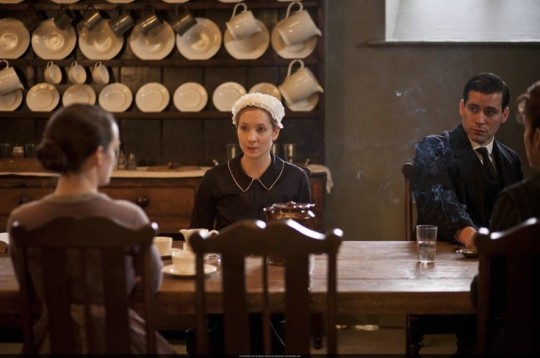
Boot Room: The Boot Room is where the valets, ladies maids, hallboys and sometimes footmen clean off shoes and certain items of clothing.
Kitchen: The Kitchen was usually either in the basement or the first floor of the house, connected to a garden where the house's vegetables were grown.
Butler's Pantry: A butler's pantry was where the serving items are stored. This is where the silver is cleaned, stored and counted. The butler would keep the wine log and other account books here. The butler and footmen would use this room.
Pantry: The Pantry would be connected to the kitchen. It is a room where the kitchens stock (food and beverages) would be kept.
Larder: The larder was cool area in the kitchen or a room connected to it where food is stored. Raw meat was often left here before cooking but pastry, milk, cooked meat, bread and butter can also be stored here.
Servants Hall: The Servant's Hall was where the staff ate their meals and spent their down time. They would write letters, take tea, sew and darn clothes. The servants Hall would usually have a fireplace, a large table for meals, be where the servant's cutlery and plates would be kept and where the bell board hung. (these bells were the way servants where summoned)
Wine Cellar: The wine cellar was where the wine was melt, usually in the basement. Only the butler would be permitted down there and everything would be catalogued by him too.
Butler's/Housekeeper's sitting rooms: In some houses, both the butler and the housekeeper had sitting rooms/offices downstairs. This was were they held meetings with staff, took their tea and dealt with accounts.
Scullery: The scullery was were the cleaning equipment was cleaned and stored. The scullery may even also double as a bedroom for the scullery maid.
Servery: The Servery connected to the dinning room. It was where the wine was left before the butler carried it out to be served. Some of the food would be delivered here to be carried out as well.
Servant's Sleeping Quarters: All servants excepting perhaps the kitchen maid and outside staff slept in the attics. Men and unmarried women would be kept at seperate sides of the house with the interconnecting doors locked and bolted every night by the butler and housekeeper. If the quarters were small, some servants may have to share rooms. Servants' bathrooms and washrooms would also be up there, supplied with hot water from the kitchens.
Rooms used by the Family

Dining room: The dining room was where the family ate their breakfast, lunch and dinner. It was also where the gentlemen took their after dinner drink before joking the ladies in the drawing room.
Drawing room: The Drawing Room was sort of a living/sitting room. It was mainly used in the evenings after dinner where the ladies would take their tea and coffee before being joined by the men. It could also be used for tea by the ladies during the day. The drawing room was seen as more of a women's room but any of the family could use it. The drawing room was a formal room but could also be used for more casual activities.
Library: The library is of course where the books are kept. The family would use this room for writing letters, reading, doing business with tenants and taking tea in the afternoons.
Bedrooms: The bedrooms would take up most of the upper floors. The unmarried women would sleep in one wing with bachelors at the furthest wing away. Married couples often had adjoining rooms with their own bedrooms in each and equipped with a boudoir or a sitting room.
Nursery: Was where the children slept, usually all together until old enough to move into bedrooms. They would be attended to be nannies and nursemaids round the clock.
Study: The study was a sort of home office where family could do paperwork, chill and write letters.
Dressing room: Dressing Rooms where usually attached to bedrooms where the family would be dressed and their clothes would be stored. The valets and ladies maids would have control of the room.
Hall: The hall was where large parties would gather for dancing or music or to be greeted before parties.
Furnishings and Decor

Most of these Great Houses were inherited which means, they came with a lot of other people's crap. Ornaments from anniversaries, paintings bought on holiday, furniture picked out by newly weds, all of it comes with the house. So most of the time everything seems rather cluttered.
As for Servant's Quarters, most of the furnishings may have been donated by the family as gifts. Most servants' halls would have a portrait of the sovereign or sometimes a religious figure to install a sense of morality into them.
#Fantasy Guide to A Great House#19th-20th Century#Anatomy of a great house#writeblr#writing reference#writing advice#writers on tumblr#writing advice writing reference#writing advice writing resources#writing resources writing advice#writing reference writing advice#Writing reference writing resources#Fantasy Guide#nobility#Servants#writing help
2K notes
·
View notes
Text
Writing fanfiction is a deeply personal and courageous act. It’s pouring a piece of your soul into something and letting your imagination breathe life into the things you love. It’s understandable to feel like you’re not good enough sometimes, but that doesn’t make it true. The fact that you’re creating at all, that you’re trying, is already something to be proud of.
Not everyone will love or even notice your work, but that doesn’t diminish its value. Somewhere out there, someone will be deeply touched by your story, even if you never hear from them. And even if no one else sees it, you are still the most important audience. You’re giving yourself something special -- a chance to grow, to dream, and to express things you may not even have words for otherwise.
It’s okay to go slow. It’s okay to feel unsure. You don’t have to be the most popular or the most polished. You just have to be you. Writing is a journey, and it’s one you deserve to take at your own pace.
When you feel like giving up, remind yourself that what you create is worth something because you created it. You don’t have to be perfect to be meaningful. Every story, every sentence, every word you write is an act of bravery and self-love.
So please, be gentle with yourself. You’re allowed to struggle. You’re allowed to doubt. But don’t let those feelings take away the joy and the pride you deserve to feel for everything you’ve already done. Keep writing, because your stories deserve to exist. And because you deserve the happiness that comes from making them real.
#now if i could just take my own advice that would be great#fanfic advice#author advice#writing advice#fanfic writing#fanfic#fanfiction#writing#writers
70 notes
·
View notes
Text
Perfect is the enemy of done. Perfect is the enemy of done. Perfect is the enemy of done. Perfect is the enemy of done. Perfect is the enemy...
#will i take my own advice?#unlikely#chris traeger voice:#'great advice. impossible to follow‚ but great advice.'#🙃#oof#creative process#gif making#art#writing
146 notes
·
View notes
Text
all I'm saying is that Show Jay would be a terrible influence on Movie Jay. Can you imagine that shy and introverted kid meeting an older and chaotic version of himself who says everything he thinks, is extremely loud and impulsive? Show Jay would probably suggest the worst possible solution to a problem like stealing/lying, and Movie Jay would only agree because he can't bring himself to tell him he's crazy.
#I'm not even a fan of the movie but there is great comedic potential in having these two interact considering they are opposites#and Show Jay giving the worst life advice and scaring his younger self#Wait I should write this-#jay ninjago#ninjago#ninjago jay#Ninjago#ninjago lego#ninjago movie#jay walker
351 notes
·
View notes
Text
here's another thing they don't tell you about grad school - it's not about how smart you are, it's about what you can do when you're exhausted, scared, unsure, and fighting a losing battle.
#this also means that if you struggled in undergrad even though you were passionate about your work you have a great chance in grad school#dark academia#light academia#grand mac speaks#but who's listening#academia#academia aesthetic#gradblr#grad school advice#graduate student#graduate school#grad school#grad#classic academia#academic validation#advice#spilled ink#spilled thoughts#spilled words#spilled writing#writing#thoughts
58 notes
·
View notes
Text
I think one element modern-day Muppet productions are missing is explosions. if you don't have stuff just blowing up for literally no reason at least once per scene then really what are you doing
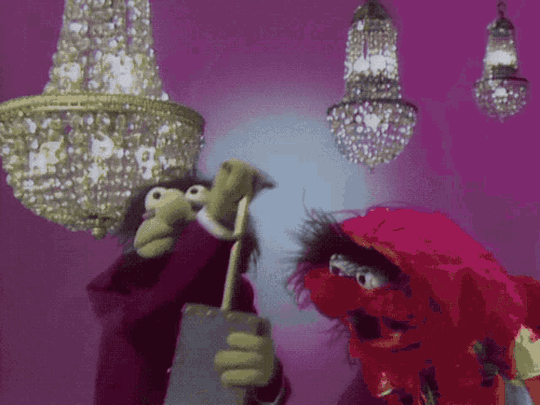
#muppets#the muppets#.gif#outdesign posts things#if I remember correctly the writers would just blow something up if a scene wasn't funny enough which is great writing advice all around#greatest hits
690 notes
·
View notes
Note
yo, some of the stuff on your blog has finally given me the ability to articulate something I haven't been able to before. (this'll be long but I don't think you'll mind lol)
the reason I've had such an issue with a lot of the "think critically of your media" sentiment I see online, is that people aren't really thinking critically about what a story(media) is saying, but what potentially bad thing it could be saying.
people would say "remember that no story is perfect!", but then demand stories be perfect anyway and condemn them as problematic for... not even their actual flaws, just perceived and potential flaws. stories would be condemned as saying something bad just because you could force a bad thing out of them, even if the argument wasn't logically sound. you could never enjoy something without a constant disclaimer of "I pretty promise I'm aware of the bigoted tropes and I don't believe them 😁" . it was exhausting.
as an example: I've seen people condemn the trope of robots or aliens (non-human people) acting like autistic people as implying autistic people aren't human... but it does not at all logically follow "this robot acts autistic, therefore if you're autistic, you're a robot", and none of the stories I know of with autistic "coded" aliens and robots are used to communicate that! yet the trope gets accused of that, even though it usually just exists to say "people should be treated as people even if they're weird", or ask "what if you don't fit in?" or "why do we(humanity generally) act this way? what if we didn't?" etc.
there's nothing inherently wrong with that trope. it's not actually saying anything bad, but people would twist it into saying something bad, and get angry at the pretzel they just made for being twisted!
but that's not actual critical thinking! you're not analyzing something to find out what it is, just what the worst possible thing it could be is (even if it doesn't logically follow). like that cursed mirror from "the snow queen".
---
all this to say: your method of asking "what is this story trying to say? what did this story say? and is that true?" is so much better and such a realer example of "critical thinking" than what gets passed off for it a lot of the time.
I appreciate this and agree with all of it!
#great thoughts#character analysis#critical thinking#fiction#fictional#writing#storytelling advice#media analysis#analysis#meta
69 notes
·
View notes
Text
This is a very good point that is such a big component in the language of art
It’s why a good story or any for of storytelling that’s made from the heart and on an aspect of life we are drawn to it! It’s because we as a social species crave community and understanding in others and we get personal with fictional figments of anthropomorphized characters.
Also side note Junji Ito is afraid of people but makes himself write about people. He’s a big fan of lovecraft too
#sillygoblinantics#anthony gramuglia#lovecraftian horror#junji ito#great writing advice#great art advice
6 notes
·
View notes
Text



well, i suppose it was my turn to do the dragon age oc template by @marianchurchland which you can find right here! i'm very happy with how these turned out and it was super fun trying to draw something more stylistic
#dragon age#dragon age origins#dragon age 2#dragon age inquisition#dao#da2#dai#dragon age art#my art#mahariel#hawke#cadash#ch: maire mahariel#ch: marie hawke#ch: estrid cadash#and shoutout to vik for encouraging me to do this template and giving me advice#do not come for me about my hand writing it's not great lol
92 notes
·
View notes
Text

Murder? I barely know her!
#murdle#dame obsidian#the idea for this came to me at 2am#word of advice!#if you get an idea at 2am#write it down and wait!#you will not feel great otherwise#(spent an hour trying to get the sketch down)#(had to undo most of it)
46 notes
·
View notes
Text
Etiquette of the Edwardian Era and La Belle Époque: How to Dress
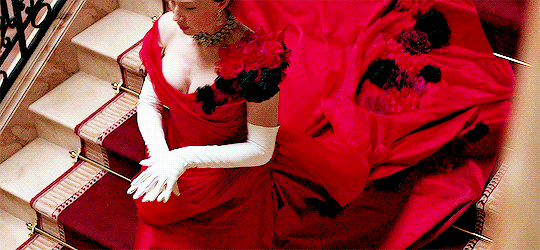
This is a new set of posts focusing on the period of time stretching from the late 19th century to the early 20th Century right up to the start of WWI.
I'll be going through different aspects of life. This series can be linked to my Great House series as well as my Season post and Debutant post.
Today will be focusing on the rules of clothes with this time period.
A Cut for Every Occasion
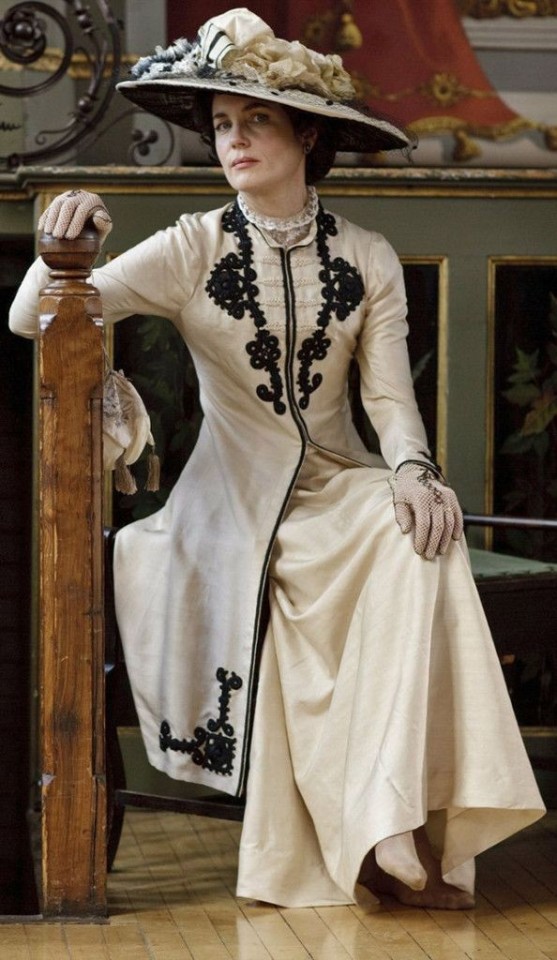
As you may know, the wealthy elite and their servants lived extremely regimented lives and every aspect was governed by careful rules. They would be expected to wear the right outfit at the right time, every minute of the day. Any misstep would be noticed at once and be subject to scruntiny.
In the circles of the elite, one would be expected to change for every occasion. One simply wouldn't wear the same outfit they've been lying around the house in to attend tea at somebody's house. Fashion in this era was dictated by the clock and by the event diary of the wearer.
Ladies
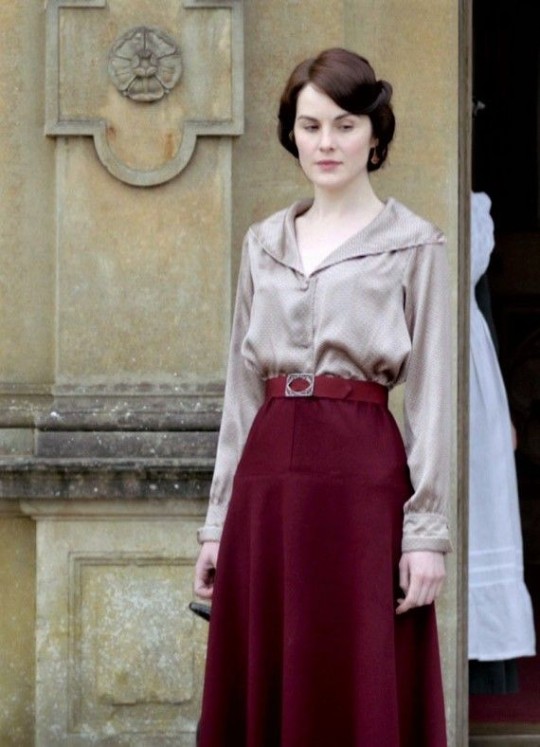
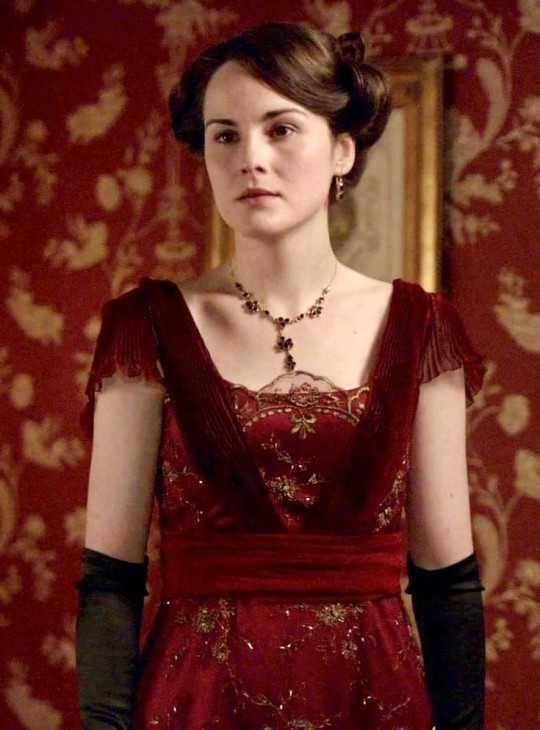
Women of the upperclass would be expected to change at least six times a day. When she would rise for a morning of repose around the house, she would simply wear a house gown or a simple blouse and skirt. If planning a morning stroll, she would change into a walking suit which is a combination of blouse, skirt and jacket along with her hat usually of tweed. If running errands or paying a visit to friends, she would wear another walking suit. If riding, she would wear a riding habit and a hat. If hosting tea or taking tea in her own home, she would change into a tea gown with is a lighter more airier gown more comfortable for chilling in. If attending a garden party, one wears a pastel or white formal day gown accompanied by a straw hat and gloves. For dinner, she would change into an evening gown which would be more elaborate and show off a little more skin than her day wear. After dinner and ready for bed, she would change into her nightgown.
Female servants had an easier time of it. A housekeeper and lady's maid would simply wear a solid black gown for the entire day. A cook and kitchen maids would wear a simple day dress for working with an apron. Housemaids would usually wear a print dress with an apron and cap, changing into the more formal black and white attire you would associate with a maid.
Gentlemen
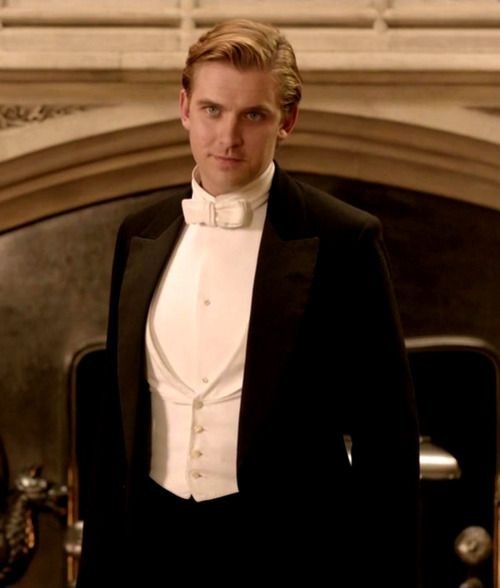
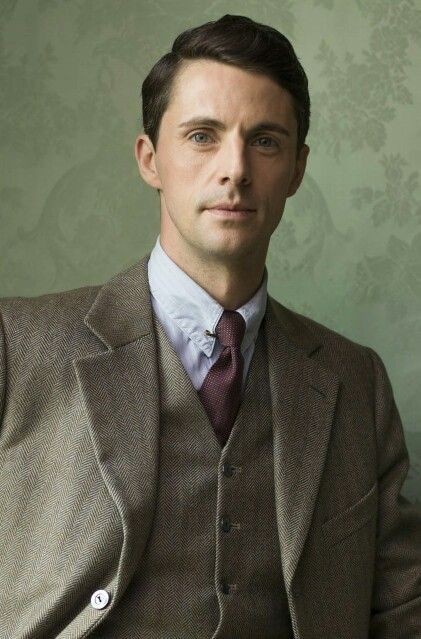
The gentlemen had an easier time but they too were subject to changes throughout the day. Men were expected to wear a suit. The most popular day time suit was a sack suit. These were comprised of plain and loose fitting jackets, worn over a starched shirt with a high collar, waistcoat and straight trousers with ironed creases. These suits were exclusively wool with cheaper ones made of a wool and cotton blend. Grey, green, brown, navy were usual but sine younger men preferred louder colours such as purple which was a trend for a time in the 1910s. These suits were worn about the house or in the city accompanied by a coat. Men would change into tweed if shooting or walking. For garden parties, a gentleman would wear a light coloured suit, usually white and a straw hat. For dinner, a man had two choices: his tails or his dinner jacket. A dinner jacket was for less formal suppers say if dining at home. This was a collection of a jacket, trousers, waistcoat, a bow tie, a detachable wing-collar shirt and black shoes. Lapels of these jackets were edged with silk or satin. Tails were worn at a formal dinner party, at White Tie events. This was made up of a tailcoat, white piqué waistcoat, a starched dress shirt with a pique bib and standing wing collar with a white bow tie. Trousers were lined with trim to hide the seams.
Male servants were soared changing. Footmen would wear their livery around the clock which would resemble white tie to a certain extent or mimic court dress of palace servants. Butler's would wear a variation of a gentleman's evening suit throughout the day. When a male servant is dressed, he usually stays that way. However, a valet or a footman may be taken to pick up during shooting parties where they would wear tweed walking suits.
Jewellery
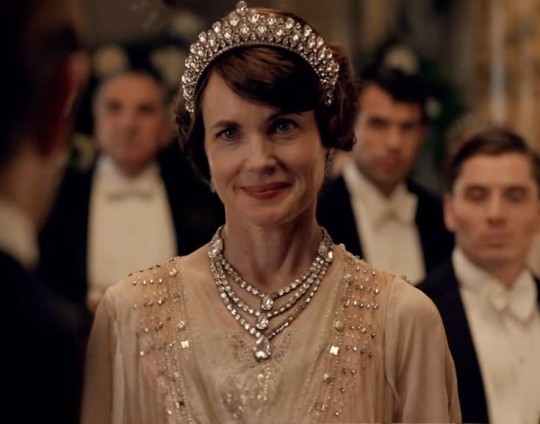
Jewellery was an important sign of status in society. Upperclass women of this time has access to untold caches of sparklers but there were rules concerning their use and meaning. Earrings were usually clip ons as women of high status would not pierce their ears. Simple, understated earrings were worn during the day with more ostentatious sets were worn in the evening time. Broaches were popular at this time, usually worn at the throat of a gown or blouse or walking suit or affixed on hats. Large stoned rings were worn over gloves while slender bands were worn under. Jewellery was intricate and understated amongst old money whole the nouveau riche went for chunkier stones and larger settings. Tiaras were only worn at White Tie events, held after six pm and almost never by unmarried girls. One would not wear a larger tiara than that most senior lady present. Men would wear tie pins, cufflinks and pocket watches to match any occasion be it for a jaunt on the town or at a formal evening party.
Hats
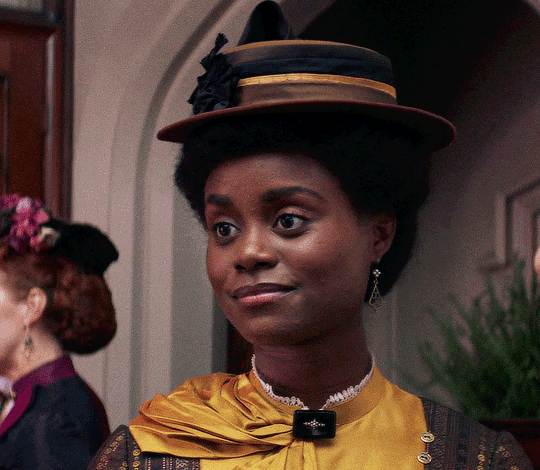
Hats were a staple in this period. Anybody respectable from any class wouldn't venture out of the door without a hat.
Men would wear hats when heading out but always remove them when entering a building, and never wear one without removing it for the presence of a lady. The bowler was seen as more a servant's headwear while a top hat was reserved for gentlemen. Flat caps would be only seen on gentlemen at shooting gatherings or in the country, they were popular among the common class for any informal occasion.
Women had more stricter rules concern hats. Hats for women were more a day accessory worn while out and about. A woman would not wear a hat in her own home even when entertaining and nor would any of the other female occupants if joining the gathering. A woman would not remove her hat when attending a luncheon or tea or any activity. Hats were held in place by a ribbon or sash tied under the chin or by a hat pin, which is essentially a large needle thrust through the hair. This was the period where women's hats became more ornate and rather large, leading to some critisism. Among servants, housekeepers and lady's maids would not wear a hat while indoors and working but a housemaid or cook or kitchen maid would cover their hair with a cap with housemaids changing into a more elaborate one come evening time. Male servants would not wear hats unless travelling or outdoors.
Gloves
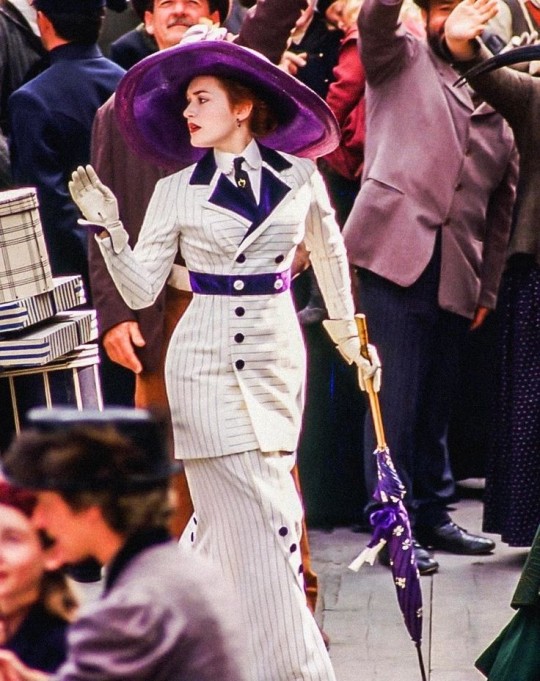
Gloves are a staple in this period and worn only at the opportune time. Among servants, only footmen would wear gloves and usually only when serving. Butlers would never wear gloves. Female servants did not wear gloves.
Men did wear gloves, usually woollen or leather while outside or riding gloves when out on horseback.
Women wore gloves whenever outside. Day gloves were usually wrist length, with evening gloves stretching to the elbow. During dinner, evening gloves would be removed at the first course and laid across the lap, replaced at the last course when the ladies leave for tea and coffee after where the gloves are then removed again. Gloves are always worn when dancing and at the theatre or opera. If one is sitting in ones box and sampling some chocolate, one can remove their gloves for that.
Hair and Makeup
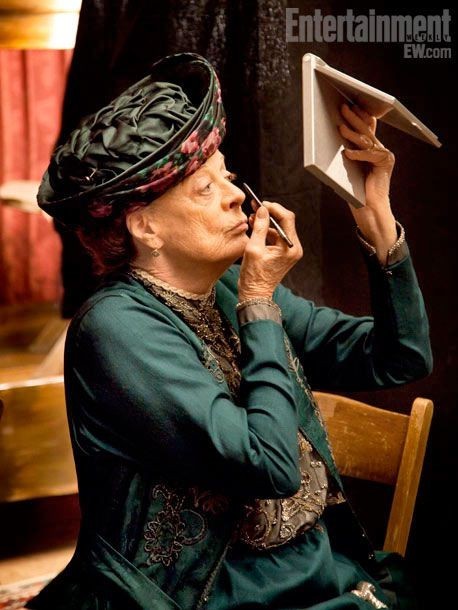
Make up was a no-no amongst the upper crust and for their servants in England and America, as it was seen as licentious but in France, the use of rouge was accepted. Perfume and cologne were acceptable but excessive use was frowned upon.
Hair was dressed by one's lady's maid. Bouffant updos were popular in this time period for married women. During the last years of this period, women began adopting the 'bob' but this was seen as radical and sometimes scandalous. Unmarried girls could wear their hair down, often with accessories like a bow to adorn their tresses. Servants would always tie up their hair and never be seen with it down or uncovered (though this depended on their job).
Men would comb their hair, slicking it back for dinner. Most men were clean shaven but if they wore beards, they were usually well groomed. Hair was kept short for grown men and teenagers but young boys may wear their hair longer whilst in the nursery.
#This bitch loooonnnnggg#Etiquette of the Edwardian Era and La Belle Époque series#Fantasy Guide#Early 20th Century#late 19th century#Great houses#writing#writeblr#writing resources#writing reference#writing advice#ask answered questions#writing advice writing resources#writers#Writing advice writing references#Writing references#Historical fiction#1900s#1890s#Fashion
655 notes
·
View notes
Note
Hey quick question.
How do you know if you should make a webcomic? I have this story idea that’s been floating around in the back of my head that I think could work well for a comic series. But the problem is I’m mainly used to writing screenplays and more traditional writing.
What I’m saying is, how can I tell if making a webcomic is worth it or if I should stick in my comfort zone?
I mean, there's no definitive right answer when it comes to "knowing" if you should make a webcomic. It really just comes down to you. Do you really like the medium? Do you feel your story has to be told within that medium to achieve its goals?
Same thing goes for whether or not it's "worth it", it really comes down to how you define that. For some people, simply posting their comics online to a few readers each week is worth it. For others, if it doesn't get into print or publishing or whatever have you, it might not be quite so justifiable to keep up with. Neither is better or worse than the other, both reasons are valid because it ultimately comes down to what we as individuals are trying to accomplish and what we define as "worth it" on a personal level.
I actually live on both sides of the spectrum right now because with Rekindled, posting it on Tumblr and getting all the great feedback and company through the audience it's gained makes it worth it. But that worth was defined by my expectations going in - I wasn't making Rekindled for money (legally I can't), I wasn't making it to get an Originals deal or anything of the sort, I was just making it because I found myself deadset on going through with it after months of it living in my head rent free, and so what I've gotten out of it as a result is very much worth it, all I was really looking for was maybe some other readers who would enjoy reading a transformative 'foe fiction' from a former LO fan and I've found those readers in spades simply due to the demand.
Time Gate, on the other hand, was something that I wanted for years to be a 'successful' project, defined more by actual tangible growth and gain. Because I came up with it as a kid, for a long time it was my "magnum opus" project, the thing that I wanted to see get turned into books and an anime and a video game and all those sorts of things as 'proof' of how good it was. Of course, I know now years later that those expectations were WAY too high and it resulted in me feeling incredibly depressed over it for ages. It made it hard to work on and even though I did have some readers, I didn't see it as "worth it" because my expectations were a lot higher than that of Rekindled's going in. But that was simply a matter of experience at that point, because I had been making original comics for so long, when I went into Rekindled I knew a lot more what I was capable of, what I wasn't capable of, and what boundaries I was willing to put down for myself. Even still, I do still want to return to Time Gate some day and when I do, I want to still treat it like a series I want to get off the ground as an actual published piece of work - it's just that this time around, I actually know how to make those steps and be proactive in my approach (and I know where to keep my expectations) which is certainly a perspective and skillset I didn't have when I was 15 LMAO
I will say, realistically speaking, it is a lot harder to pursue webcomics as a writer, because the reality of this medium is that most people who go into it are artists who learn how to write to make a webcomic, not the other way around. Unless you're willing to learn how to draw - which is a whole other skillset that requires years of work and patience - you're likely going to have to seek someone to collaborate with and - I cannot stress this enough - it's not going to be someone you simply find on reddit who's willing to work for free. Again, many of us as artists went into webcomics with a project already in mind, so most artists are already working on their own passion projects, trying to convince someone else to work on yours is just not realistic or fair. I'm fortunate enough to have @banshriek along for the production of Rekindled and even then I still pay for their contributions out of pocket, they're as invested in an LO rewrite project as I am (and thus they're given a lot of room to make suggestions in both the set designs and the writing), and I still had to carry the first 20ish episodes on my own before they joined along, i.e. I would still be making Rekindled if they weren't onboard, but having them is a massive help that's taken the comic to a whole other level in its artistic production.
But that doesn't mean it's hopeless! There's a lot of interest right now in webnovels and writing comic scripts is still a completely viable way to get into the comics industry if you're really interested in doing so (fun fact: before I was making comics, I wrote fanfiction! This is probably not shocking to hear all things considered LMAO) There's a reason Webtoons owns Wattpad now, webnovels are a no-brainer when it comes to adaptations to visual mediums, and webcomics have become part of that environment by extension. So at the very least, if you want to get your story out there, there are loads of ways to do it that don't require you to make a comic - but if you really want to make one, there are ways to get into that industry through writing in other ways such as pitching scripts to comic publishers and/or going indie with webnovels. Ultimately, if many of us webcomic creators stopped drawing our works, we'd still be coming up with stories to write, because that's what's really at the heart of these sorts of projects. So even if you can't get into comics right away due to lack of visual artistry, that doesn't mean it's off the table forever ( ´ ∀ `)ノ~ ♡
Sorry, that was a lot of rambling but I hope it helps ! Remember to keep your goals and expectations manageable, and most of all, write lots! You'll be doing it anyways regardless of whether or not you get into comics, so whatever value you see in getting into comics is up to you to determine! You don't have to know right away, it might be something you'll find along the way or have to adjust as you get more experience, but don't stop yourself from getting creative and messing around until you find out what works! You won't know if it was worth leaving your comfort zone until you try it <3
Good luck! (•̀ᴗ•́)و
#wattpad isn't the only option for webnovels btw#there's also royal road which i've heard is pretty good#you can also just go with the ole' classic tumblr blog#also look into scrivener for writing software#it comes with some great comic script templates#but you can also find script templates online that you can use in software like LibreOffice !#comic advice#webcomic advice#writing advice#ama#ask me anything#anon ama#anon ask me anything
52 notes
·
View notes